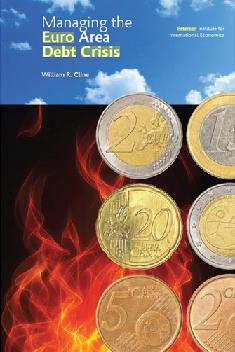Fernandes, S. (2014) “Who calls the shots in the euro area? “Brussels” or the member states?“, Policy Paper 111, Jacques Delors Institute, 15 Μαΐου. The recent reform of the European economic governance has helped to foster the perception that Europe is impinging on the sphere of national sovereignty. It is certainly true that member states have established a framework of common action at the European level in an effort …Read More
European Wage Depression Since 1999
Janssen, R. (2014) “European Wage Depression Since 1999“, Social Europe Journal, 30 Μαΐου. Probably one of the most popular slogans of the entire European Semester is the catchphrase that wages should be aligned with productivity. The reason for its popularity is that this phrase can be used with a lot of flexibility. On the one hand, the Commission can make use of it to discipline wages and undermine national …Read More
Shifting EU Institutional Reform into High Gear: Report of the CEPS High-Level Group
Blockmans, S. & Piedrafita, S. (2014) “Shifting EU Institutional Reform into High Gear: Report of the CEPS High-Level Group“, Politics and Institutions, CEPS Task Force Reports, 19 Μαρτίου. To contribute to the important debate on EU institutional reform in the run-up to the European Parliament elections and the start of a new Commission, CEPS formed a High-Level Group on EU Institutional Reform under the leadership of Danuta Hübner MEP …Read More
Managing the Euro Area Debt Crisis
Cline, R. W. (2014) Managing the Euro Area Debt Crisis, Washington: Peterson Institute for International Economics, Ιούνιος. First came the financial and debt crisis in Greece, then government financing difficulties and rescue programs in Ireland in 2010 and Portugal in 2011. Before long, Italy and Spain were engulfed by financial contagion as well. Finally in 2012, the European Central Bank pledged to do “whatever it takes” to preserve the …Read More
Bringing Europe closer to the people
Schultz, M. (2014) “Bringing Europe closer to the people“, European Parliament: Articles, 10 Ιουλίου. “Isn’t it rather that Europe turns away from the people?” This question from a Danish woman during a debate on why people turn away from Europe got Martin Schulz thinking for months. “This sentence really touched me,” he told us a few months later in an interview. “Maybe it isn’t true, but we have to …Read More
Let’s get to Work! The Future of Labour in Europe
Beblavý, Μ., Maselli, Ι. & Veselkova, Μ. (2014) “Let’s get to Work! The Future of Labour in Europe“, Economic Policy, CEPS Paperbacks, 10 Ιουλίου. Work is both an essential part of our daily lives and one of the major policy concerns across Europe. Yet the public debate of labour issues is all too often driven by political rhetoric and short-term concerns. In this volume, researchers from seven European countries …Read More
Europe between financial repression and regulatory capture
Pagliari, S., Vallée, S. & Monnet, E. (2014) “Europe between financial repression and regulatory capture“, Working Paper 2014/08, Bruegel Think Tank, 10 Ιουλίου. The financial crisis modified drastically and rapidly the European financial system’s political economy, with the emergence of two competing narratives. First, government agencies are frequently described as being at the mercy of the financial sector, routinely hijacking political, regulatory and supervisory processes, a trend often referred …Read More
Juncker’s Make-or-Break Presidency
Merritt, G. (2014) “Juncker’s Make-or-Break Presidency“, Project Syndicate, 09 Ιουλίου. Some say that political theater, not policies, drives democracies, and that’s certainly true of the drama – with comic overtones – that has been playing out in the European Union. The European Parliament elections in late May highlighted the “big picture” of the EU’s accelerating unpopularity; yet that warning was quickly eclipsed by the much smaller question of who …Read More
Τι έμαθε η Ελλάδα από την κρίση – Και πώς πρέπει να προχωρήσει
Ζουμπουλάκης, Μ. (2014) “Τι έμαθε η Ελλάδα από την κρίση – Και πώς πρέπει να προχωρήσει“, ForeignAffairsHellenicEdition, 09 Ιουλίου. Η ελληνική οικονομία βρέθηκε μετά το 2009 στη μεγαλύτερη κρίση τής ιστορίας της. Οι αιτίες τής κρίσης είναι οικονομικές και πολιτικές. Γεννήθηκε και μεγάλωσε στο πλαίσιο του στρεβλού πελατειακού μας πολιτικού συστήματος. Χρειάζεται, λοιπόν, αλλαγή στο παραγωγικό μοντέλο τής χώρας. Αλλά αυτό δεν αλλάζει χωρίς κρατική καθοδήγηση… Σχετικές αναρτήσεις: …Read More
EU democracy should be based on the principle of respecting diverse identities, not uniting through the creation of a European demos
Innerarity, D. (2014) “EU democracy should be based on the principle of respecting diverse identities, not uniting through the creation of a European demos“, LSE EUROPP, 09 Ιουλίου. Is the development of a European ‘demos’ necessary for the EU to be democratic? Daniel Innerarity writes that while a shared demos is often put forward as a fundamental aspect of democracy, it also entails certain negative developments, such as a …Read More






